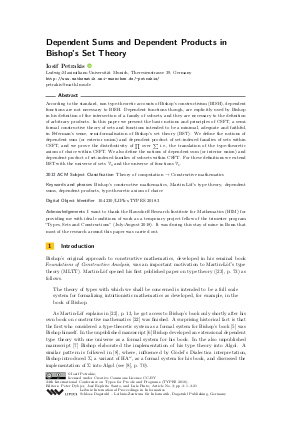@InProceedings{petrakis:LIPIcs.TYPES.2018.3,
author = {Petrakis, Iosif},
title = {{Dependent Sums and Dependent Products in Bishop’s Set Theory}},
booktitle = {24th International Conference on Types for Proofs and Programs (TYPES 2018)},
pages = {3:1--3:21},
series = {Leibniz International Proceedings in Informatics (LIPIcs)},
ISBN = {978-3-95977-106-1},
ISSN = {1868-8969},
year = {2019},
volume = {130},
editor = {Dybjer, Peter and Esp{\'\i}rito Santo, Jos\'{e} and Pinto, Lu{\'\i}s},
publisher = {Schloss Dagstuhl -- Leibniz-Zentrum f{\"u}r Informatik},
address = {Dagstuhl, Germany},
URL = {https://drops.dagstuhl.de/entities/document/10.4230/LIPIcs.TYPES.2018.3},
URN = {urn:nbn:de:0030-drops-114070},
doi = {10.4230/LIPIcs.TYPES.2018.3},
annote = {Keywords: Bishop’s constructive mathematics, Martin-L\"{o}f’s type theory, dependent sums, dependent products, type-theoretic axiom of choice}
}

 Creative Commons Attribution 3.0 Unported license
Creative Commons Attribution 3.0 Unported license
























